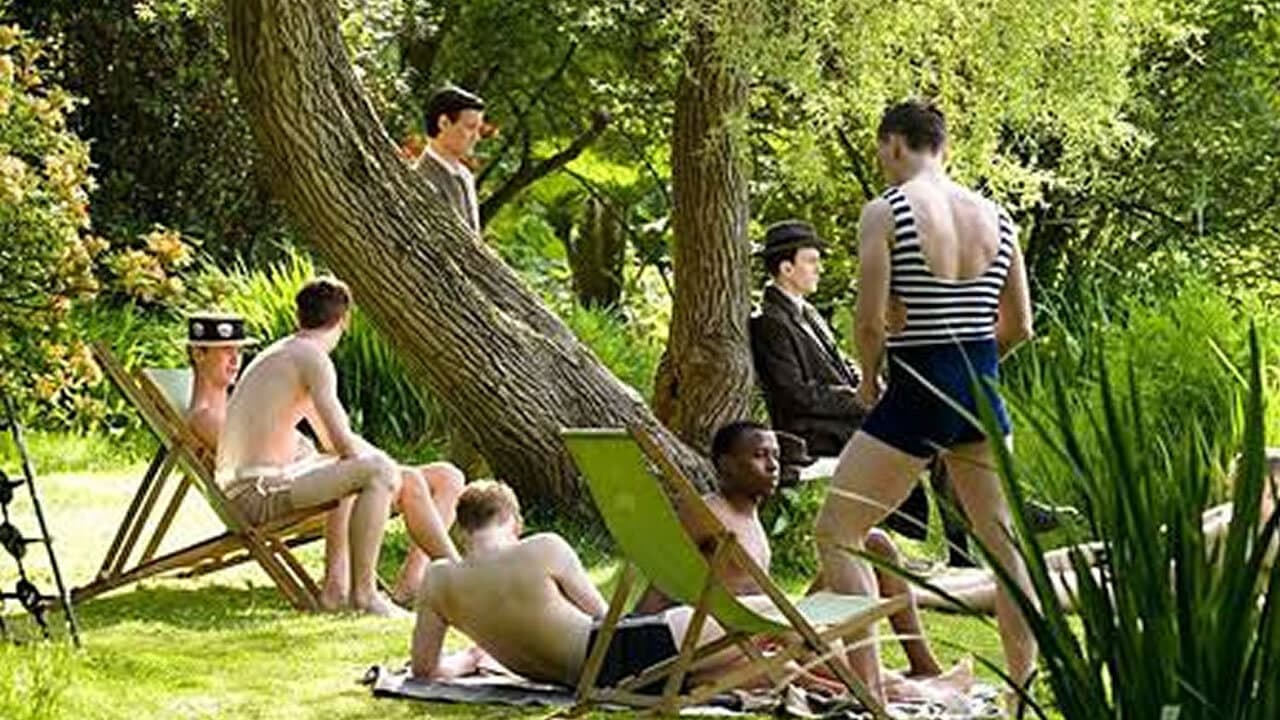

It is supposed to be a true story that happened to a young man later remembered or rather recollected by the same man grown quite older, some forty years later. It happens around 1933 in Berlin centering on Hitler's arrival to power.The young English, aristocratic man from England, Christopher Isherwood, goes to Berlin to meet with the young men available there most of the time for a price. He will let himself roll and rock in this atmosphere though he will be very hostile to the exchange of money that he will always refuse in his mind. That will lead him to confronting one of his regular lovers and that lover will plainly disappear after that confrontation, only to be met against in the brown uniform of the SA though identified as a SS uniform.He does not understand that in the crisis in Germany in 1933 many young men who had no work chose to make the surviving money they needed by renting their bodies for a short moment to other men, generally older men, for a small amount of money, since they could not rent their bodies to an employer who would make a profit out of it by investing their work in the production of goods. Morally, socially and even physically there is no difference. Christopher does not understand there is no love in that exchange. Nothing but a commercial action of sheer survival.And the only choice they have if they do not want to go on or to start that "professional" activity is to join the SS, the SA, the Nazi Party and make a living by crushing the lives of others, Jews, merchants, gays, or whatever – mind you not whoever – is in the way of their getting rid of as many millions of people possible to make the misery and poverty of the others just one iota better.He will though find the love he is looking for. But he will not be able to keep him in Great Britain after the arrival of Hitler because a British civil servant will understand the sexual dimension of the attachment and refuse the visa. That will end badly for that young German, Heinz, in the hands of the Gestapo, with one year of forced labor and two years in the army.That could have been a good though sad end, but the author morbidly goes one step further in his self-accusation. He goes back to Berlin in 1952 and meets the people who have survived Hitler. His landlady, for one, who makes him a present. And of course Heinz who lives in East Berlin though the Wall has not been built yet. Without giving the details of that end, it reveals how deep the uncaring carelessness of Christopher in 1933 has become a selfish nostalgia that turns the uncaring carelessness into a blunt rejection.The film is well done, shows the atmosphere in Germany in 1933, though rather superficially, but it reveals the extreme egotism of that man who only considered Berlin as a hunting ground and revisits it when the raptor, vulture and predator he has been has found his balance in the evanescent scintillating world of Hollywood.A sad, very sad vision of these aristocrats who can do what they want, provided they satisfy their desires in a lower social strata than theirs. Oscar Wilde (shown burning in Berlin) did the reverse and could not be accepted: he, a plebeian Irishman, who captured the passion of a young English Lord. Social, aristocratic divide breaking, ethnic and national rebellious crime against at the time Her Majesty's supreme aristocracy. To prison and then banned from proper English society, though the young Lord pays no price, of course not.We have in this film the reverse situation and it reveals the extreme self-centered blindness of the author at the time of events.Dr Jacques COULARDEAU
... View MoreIf we have to look at BBC's "Christopher and His Kind" only as an informative piece about the Germany during the Nazi regime told by the perspective of a known writer, the movie works perfectly fine; but as an adaptation of Christopher Isherwood's autobiography it doesn't go quite right. I haven't read the book (and perhaps will never do since this is still unavailable here) but I can surely guess that inside of it there's much more than show an hedonistic type who went to Berlin because of the boys and his fascination for them, more liberated there than in his repressive England. Something tells me that in the printed material there's way more than what we're told on the screen.As a biographic film the story provides some good insights into Isherwood's life and his time, his writing and his passions. Played by Matt Smith ("Doctor Who") in a quite reliable way, the writer of "Mr Norris Changes Trains" has his fun, good and bad moments just like anyone else, falls in love and has to fight for it; and deals with the advance of the Nazism. In other words, it's an usual biography film that shows a small period of life of a personality. But compared to, let's say, Bennett Miller's "Capote", this TV movie doesn't go very far in almost anything (except for some good sexual scenes).Getting into it it's not that easy, the whole "Cabaret" segments are irritating and repetitive; most of the time it's fun and a little adventure here and there, the problems never are presented as something dreadful, dramatic, everything seems to be easily solved for these characters when in fact during the days of WWII things weren't so simple. But what makes the movie not hold much of its audience attention is to give a deep look to its main character, I mean, what did he learn from this experience and what can we learn from his experience? He's just a vain figure who wants to share his adventures and that's it?For a TV movie is quite okay, totally watchable, and it's not a total waste of time. More was needed for all involved, cast, crew, writer and direction. 7/10
... View MoreThis is the BBC at its most disappointing, delivering glossy, glib, entertaining "product" which could have been, should have been, something deeply moving and profound. Acting, writing, directing, and production are all competent...and nothing more.Matt Smith's performance amounts to one unconvincing pose after another. To play Isherwood, one of the Fox brothers (James or Edward) in his prime would have been ideal. Surely there's a British actor out there who could have made an indelible impression with this part; Smith doesn't have the edge. It's hard not to think of you-know-Who when he does his trademark OTT posturing. There's no depth here.Deeply disappointing.
... View MoreAn otherwise brilliant idea was ruined by Matt Smith's performance. This actor had just done a few 'bit' parts in UK drama until he was cast to play BBC's 'Dr Who'. His abilities are fine for light entertainment - but it doesn't make him a good actor.He was clearly chosen to play this role purely because of his 'Dr Who' connection - not for the merit of his potential performance. Having him attached no doubt gave Mammoth the green light they needed from the BBC. He brought nothing to the role of Christopher Isherwood - a rich, complex and intriguing man who was a seminal and critical voice of Nazi Germany in the run up to WWII. Matt Smith was unable to cope with such a demanding character and brought nothing to the part. A really lacking performance. He was also completely 'out acted' by his fellow cast - each and every one of them.Get back to the Tardis, Mr Smith and leave the proper acting to the decent actors out there. You ruined a potentially brilliant piece of drama.
... View More